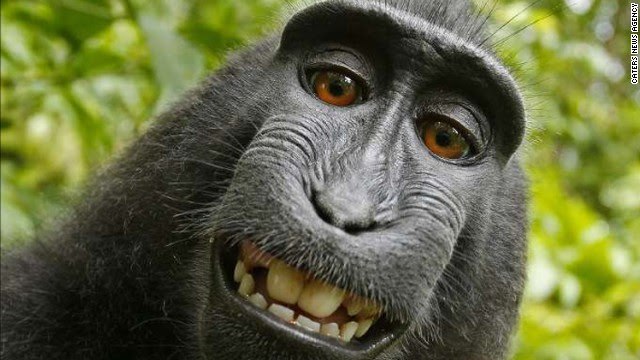Martin Eve (Oct. 2, 2014), 3:00 – 4:00, Room 2601 Du Bois Library – Martin Eve, Director of the Open Library of Humanities, will speak on open access in the humanities.
Tag Archives: UMass events
Discussion on the Monkey Selfie: Copyright and Authorship
If a hundred monkeys type out shakespeare, is it copyrighted? What about if one monkey takes a selfie?
Hi folks,
Next week, Thursday, September 4, from 3 to 5pm, we’ll hold a discussion session in Room 1320 on the “monkey selfie” — is it copyrightable? should it be? why or why not? Photographers, animal rights activists, cognitive scientists, and IP lawyers have been arguing about this issue for a while, but it’s taken on renewed interest in light of the Indonesian macaque selfies made possible by photographer David Slater, who has been claiming copyright over the works.
Snacks provided, but no nit-picking. RSVP to lquilter@library.umass.edu.

For an amusing (but factually inaccurate) “Shouts and Whispers” from the New Yorker, see http://www.newyorker.com/humor/daily-shouts/statement-monkey
Copyright Education for Students – BLC webcast
Copyright Education for Students – Jan. 15, 2014, 3-4pm.
Du Bois Library, Room 2601. Boston Library Consortium webcast.
Kirtsaeng v. Wiley: Imports, First Sale, and Unintended Consequences in the Supreme Court
Kirtsaeng v. Wiley: Imports, First Sale, and Unintended Consequences in the Supreme Court
Monday, October 29, 9:30 am
Du Bois Library, 26th floor
ALERT: TALK POSTPONED DUE TO HURRICANE SANDY.
The Supreme Court is holding oral arguments on Monday, October 29, in a copyright “first sale” case, ”Kirtsaeng v. Wiley”. The W.E.B. Du Bois Library at UMass Amherst will be holding a talk in advance of oral arguments, at 9:30, with coffee and refreshments. On the table will be how “Kirtsaeng” could affect ”everything”: from libraries’ right to lend books, to your right to re-sell or give away books, music … shampoo bottles, refrigerators, cars.
This case has been flying under-the-radar compared with the more familiar “fair use” doctrine cases, but its implications are mind-blowing. Publishers argue that the “import” rules in copyright give them the right to control the import of copyrighted materials made outside the USA. Libraries, consumer rights groups, and a host of others argue that the first sale doctrine should trump the import rules — so that once the copyright holder has sold the item for the first time, they can’t control the purchaser’s re-sale, lending, or giving it away, no matter where it was made.
Why do we care? Well, not only do libraries buy a lot of foreign titles, but it turns out that a lot of books and journals and copyrighted material of all sorts have been outsourced for “manufacture”. And, moreover, nowadays, all sorts of goods include copyrighted content — everything from shampoo bottles with printed labels, to cars incorporating electronics and software. In other words, the outcome of this case could apply to anything electronic, written, artistic, or with a printed design that is made out of the USA.
So first thing Monday morning, Oct. 29, stop by for a discussion of this fascinating case. Caffeine, calories, and copyright conviviality provided. Contact Laura Quilter, lquilter@library.umass.edu, with any questions.